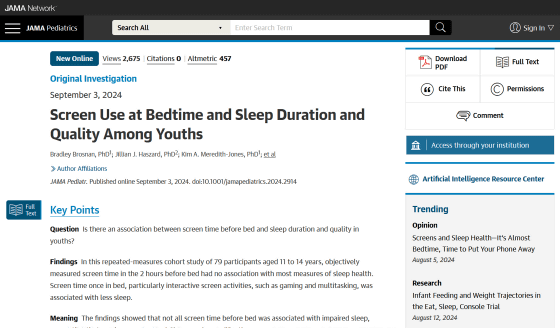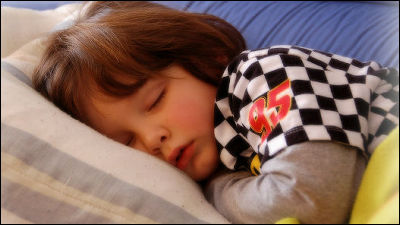The cause of disrupted sleep may not be looking at your smartphone before going to sleep, but looking at your smartphone in bed

Some people may try not to use their smartphones too much before going to bed in order to improve the quality of their sleep. However, a new study suggests that the cause of sleep disruption may not be looking at your smartphone before going to bed, but rather looking at your smartphone in bed.
Screen Use at Bedtime and Sleep Duration and Quality Among Youths | Sleep Medicine | JAMA Pediatrics | JAMA Network

Children who watch screens in bed have the most disrupted sleep - Earth.com
https://www.earth.com/news/children-who-watch-screens-in-bed-have-the-most-disrupted-sleep/
It is generally believed that using digital devices such as smartphones and tablets before going to bed can delay sleep and reduce the quality of sleep. A New Zealand research team investigated whether screen time before bed affects children's sleep duration and quality.
The research team conducted a study to measure screen time before bedtime among 79 children aged 11 to 14 years old living in Dunedin , South Island, New Zealand. In the study, the children's screen time was measured for four consecutive days from two hours before bedtime until they closed their eyes to go to sleep using a wearable camera attached to their chest and an infrared camera installed in the room. In addition, the subjects wore an accelerometer on their wrist to measure sleep time and quality.

The study found that all but one child looked at screens before bedtime, but the two hours of screen time before bed had little effect on the total amount or quality of sleep that day.
Additionally, more than half of children used their smartphones or tablets in bed, and a third used their devices after a failed attempt to fall asleep. Interestingly, screen time in bed was associated with delayed fall asleep and shorter sleep time overall.
According to the research team, the effects of using smartphones and tablets in bed were particularly noticeable in activities such as gaming and multitasking. 'Screen time after going to bed affected sleep. Children fell asleep about 30 minutes later and slept less that night,' said Dr. Bradley Brosnan of

The results of this study suggest that the reason why using a smartphone or tablet before bedtime disrupts sleep is not due to blue light or other factors, but rather that it simply delays the time it takes to fall asleep.
'A simple sleep guideline is to keep devices out of the bedroom. It's okay to allow your child to use devices before bedtime, but not in bed,' Brosnan said.
Related Posts:







